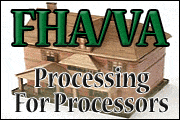FHA Training Courses
Best-Selling Training Courses:
Online Training Courses
Need Training For Providing FHA Loans?
Need FHA training? Then take an FHA class through the Mortgage Training Center!
An FHA loan is a type of government-backed mortgage insured by the Federal Housing Administration, a branch of the U.S. Department of Housing and Urban Development, or HUD. FHA borrowers pay for mortgage insurance, which protects the lender from a loss if the borrower defaults on the loan.
Essentially, the FHA - short for the Federal Housing Administration - provides mortgage insurance on loans made through FHA approved lenders.
Because they are government-backed, FHA home loans have attractive interest rates and less stringent qualifications on things like down payment amounts and credit scores. Conversely, FHA loans are not as attractive as conventional loans due to FHA's loan limit restrictions, higher mortgage insurance costs, and stricter appraisal guidelines.
That said, the FHA has different requirements than conventional loans, so mortgage professionals must be properly trained.
Find FHA Loan Training Products & Services
The Mortgage Training Center is your home for all types of FHA training, including FHA underwriting training, FHA reverse mortgage training, FHA loan training and training for FHA loan processing.
Our FHA underwriting training classes come in webinar and online formats that can get you up to speed on the fastest growing segment of FHA lending.
Here are a few of the things you will learn from taking one of our FHA training classes:
- Basic Compliance
- Required Disclosures

- Guidelines For Occupancy, Ratios, Employment, Eligibile Borrowers
- Basic income, assets, credit history, liabilities, and related underwriting requirements
- How to calculate loan amounts, qualifying ratios, and mortgage insurance premiums
- Maximum mortgage amounts
- Down Payment Requirements
- Appraisal Requirements
- Documentation Standards
- The forms required for FHA financing
- Basic income, assets, credit history, liabilities, and related underwriting requirements
To find training to meet your FHA training needs, either choose a recommended course below, or select "FHA" and your state from the "Professional Development" section of the search box below.
Best-Selling Training Courses:
Online Training Courses
Top FAQs
Borrowers are required to pay a mortgage insurance premium, are subject to loan maximums, and meet minimum property standards.
An FHA loan is a type of government-backed mortgage insured by the Federal Housing Administration, a branch of the U.S. Department of Housing and Urban Development, or HUD. FHA borrowers pay for mortgage insurance, which protects the lender from a loss if the borrower defaults on the loan.
FHA home loans have attractive interest rates and less stringent qualifications on things like down payment amounts and credit scores.
FHA loans are not as attractive as conventional loans due to FHA's loan limit restrictions, higher mortgage insurance costs, and stricter appraisal guidelines.
FHA loans are typically easier to qualify for, with lower down payment and credit score requirements, making them a perfect solution for those that can't qualify for a conventional loan.
An FHA Loan Processor is responsible for analyzing the loan applications, assessing creditworthiness, and determining the likelihood of loan repayment.
Find Seminars, Webinars, And Online Training In Your Area
About FHA Loans
The FHA program was created in response to the rash of foreclosures and defaults that happened in 1930s; to provide mortgage lenders with adequate insurance; and to help stimulate the housing market by making loans accessible and affordable for people with less than stellar credit or a low down payment.
Who Qualifies For An FHA Loan? To be eligible for an FHA loan, borrowers must meet the following lending guidelines:
- FICO score of 500 to 579 with 10 percent down or a FICO score of 580 or higher with 3.5 percent down
- Verifiable employment history for the last two years
- Income is verifiable through pay stubs, federal tax returns and bank statements
- Loan is used for a primary residence
- Property is appraised by an FHA-approved appraiser and meets HUD property guidelines
- Your front-end debt ratio (monthly mortgage payments) should not exceed 31 percent of your gross monthly income. Lenders may allow a ratio up to 40 percent in some cases
- Your back-end debt ratio (mortgage, plus all monthly debt payments) should not exceed 43 percent of your gross monthly income. Lenders may allow a ratio up to 50 percent in some cases
Who Offers FHA Loans? FHA loans are issued by approved banks and lending institutions, who will evaluate your qualifications for the loan. FHA loans are federally backed mortgages designed for low-to-moderate-income borrowers who may have lower than average credit scores.
What Is FHA Direct Endorsement?Under FHAs Direct Endorsement (DE) program, approved lenders may underwrite and close mortgage loans without FHAs prior review or approval. This includes all aspects of the mortgage loan application, property analysis, and borrower underwriting.
To obtain DE approval, a lender must demonstrate it has the qualifications, experience, and expertise to underwrite mortgage loans that satisfy FHA requirements.


